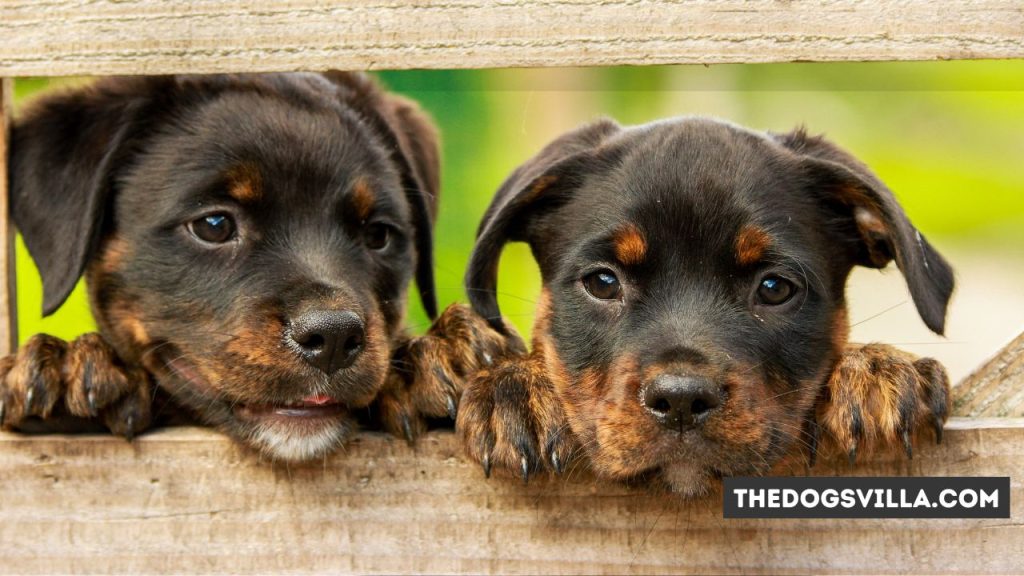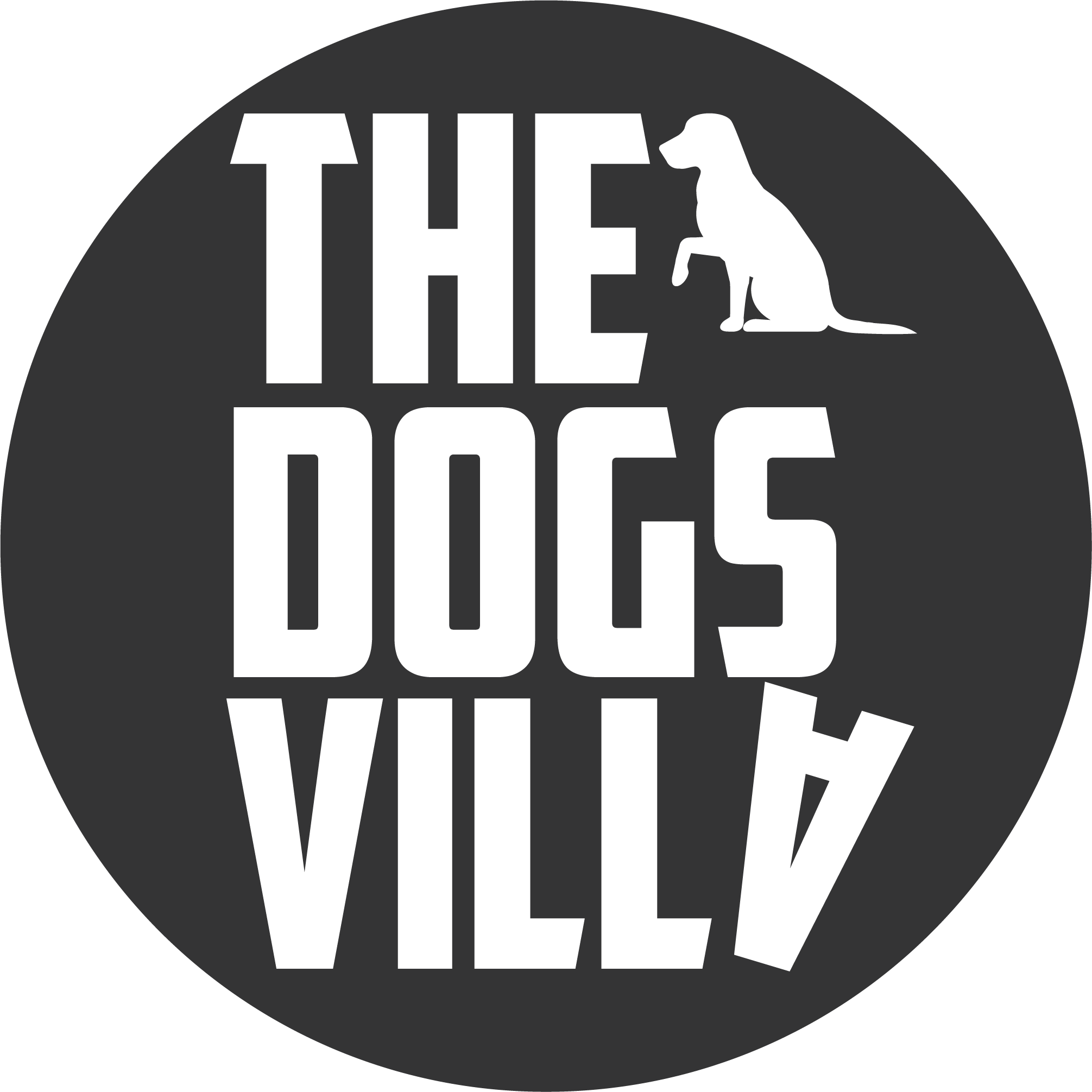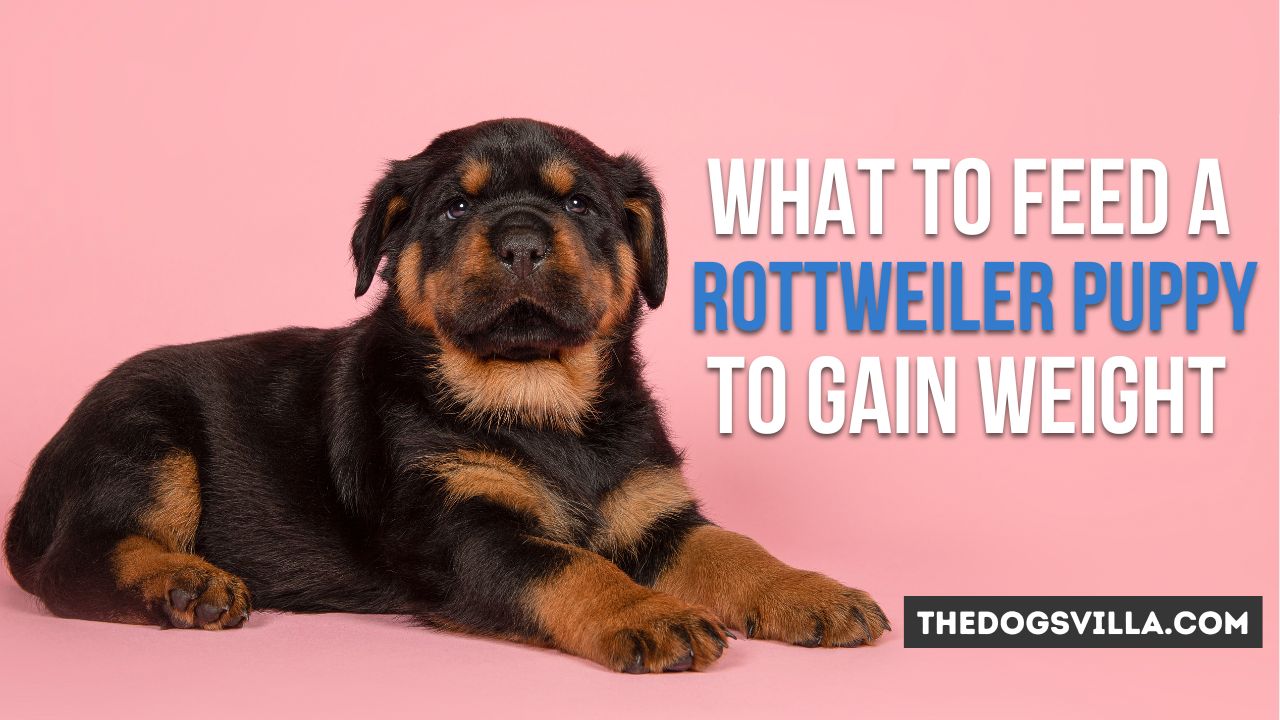The health and happiness of your Rottweiler puppy is of the utmost importance to you as its owner. When your Rottweiler is young, he or she needs a healthy diet. It’s tempting to go overboard with treats and human food, but making sure your dog gets enough of the necessary nutrients is essential for weight gain.
All of a Rottweiler puppy’s developing muscles, organs, bones, and brains need a healthy amount of weight. Puppy obesity and developmental issues might result from a poor diet or excessive feeding. In order for your Rottweiler puppy to gain weight, what foods should it eat? This comprehensive guide covers the topic of feeding for Rottweiler puppies.
Contents
- 1 What to Feed a Rottweiler Puppy to Gain Weight
- 2 What to Feed a Rottweiler Puppy
- 3 Feeding Schedules for Weight Gain
- 4 Human Grade Foods and Toppers
- 5 10 Tips for a Rottweiler Puppy to Gain Healthy Weight
- 5.1 1. Choose a High-Quality Puppy Formula
- 5.2 2. Feed Puppy Food Longer
- 5.3 3. Provide Multiple Small Meals
- 5.4 4. Try Puppy Food Soaking
- 5.5 5. Mix in Nutrient-Dense Wet Foods
- 5.6 6. Offer Healthy Supplemental Treats
- 5.7 7. Check Weight Weekly
- 5.8 8. Assess Body Condition Score
- 5.9 9. Provide Free-Choice Cool Water
- 5.10 10. Choose Slow-Growth Formulas If Overweight
- 6 Frequently Asked Questions
What to Feed a Rottweiler Puppy to Gain Weight
To begin creating a dietary regimen to help your Rottweiler puppy gain weight, the initial stage is determining his specific caloric requirements. The individual’s calorie requirements are determined by factors such as age, current weight, activity level, and predicted adult weight.
Determining Growth Stage
Rottweiler puppies go through various growth periods during their first year:
Early Puppyhood (8 weeks – 16 weeks)
- Rapid growth
- Brain development
- Socialization
Adolescence (4 months – 7 months)
- Slower growth
- Muscle development
Maturity (1 year – 1.5 years)
- Reaching full adult size
- Filling out frame
You’ll need to adjust your puppy’s caloric intake during these different growth phases.
Using Growth Charts
One way to estimate if your Rottweiler puppy is at a healthy weight is consulting a Rottweiler growth chart. This chart tracks average weights for Rottweiler puppies at certain ages.
If your puppy falls significantly below the average, he likely needs more calories. Going above average may mean cutting back on calories to prevent excess weight gain.
While growth charts offer guidelines, each puppy grows at a slightly different rate. So other factors like body condition score also come into play when determining optimal weight.
Factoring In Activity Level
Activity levels influence your Rottweiler puppy’s caloric needs too. The more active he is, the more calories he will need to fuel growth and replace burned energy.
Consider if your puppy will be a:
- Companion pet
- Sport prospect
- Working dog
More active future working dogs and athletes require feeding upregulation to support their higher activity levels. Couch potato pets need fewer calories to avoid obesity.
When calculating your puppy’s needs, be realistic about his expected lifestyle. This ensures your feeding program fuels the right amount of energy.
What to Feed a Rottweiler Puppy
Feeding a premium puppy food formulated specifically for large breeds like the Rottweiler sets the foundation for proper growth and development. These diets contain optimal protein, fat, carb, and calorie levels tailored to the nutritional needs of rapidly growing big pups.
Dry Kibble Diets
Dry puppy kibble offers a complete diet in an affordable, convenient form. The best puppy foods have high-quality animal protein sources like chicken, lamb, or fish as the first ingredients.
Look for large breed puppy foods with at least 22% protein and 12% fat levels. The crude fiber percentage should fall around 5%. These provide the right balance of nutrients to fuel growth.
When calculating amount to feed your Rottweiler puppy, follow guidelines on the bag or consult your veterinarian. As your puppy grows, you’ll gradually increase kibble quantities to meet his developing caloric needs.
Best Dry Puppy Foods
Here are top-rated dry puppy foods appropriate for a growing Rottweiler puppy:
| Brand | Name | Key Features |
|---|---|---|
| Wellness | Complete Health Large Breed Puppy | Deboned chicken, chicken meal & salmon meal. Enriched with fruits & veggies. DHA for brain development. |
| Diamond Naturals | Large Breed Puppy Formula | Cage-free chicken first ingredient. Formulated for muscle growth & bone health. Supports immune system. |
| Blue Buffalo | Life Protection Large Breed Puppy | Deboned chicken, chicken meal and fish meal. Wholesome whole grains, garden veggies and fruit. |
Table: Best dry puppy foods for a Rottweiler puppy
As long as your puppy continues gaining weight appropriately, sticking with one quality puppy formula simplifies deciding what to feed. This consistency also makes housetraining easier since the poops stay the same.
Wet & Canned Food
While less convenient and costlier per serving than kibble, incorporating some wet or canned food into your puppy’s diet provides benefits. The higher moisture content of canned foods helps support hydration. Many puppies find canned food more palatable too, making it useful for finicky eaters or supplementing kibble.
When introducing wet foods, do so slowly by adding a spoonful on top of kibble. This prevents digestive upset from too rapid diet changes.
Some good-quality wet puppy food options include:
- Purina Pro Plan Focus Puppy Large Breed Formula: Features real chicken as the #1 ingredient. Contains DHA, EPA, glucosamine, and chondroitin for development.
- Hill’s Science Diet Puppy Large Breed Chicken Recipe: Real chicken, vitamin C and vitamin E support immune system health. Omega-3 DHA for brain & vision development. Antioxidant blend.
Raw Diets
Feeding rax food balances becomes especially important for proper growth and nutrition. Consult an experienced veterinarian to develop the right homemade or commercial raw diet customized to your Rottweiler puppy’s needs.
Potential benefits of species-appropriate raw diets include:
- Healthier skin and coat
- Smaller, less smelly stools
- Increased energy levels
- Improved digestion
However, improperly formulated or handled raw diets can cause nutritional deficits or illness. Work closely with your vet to provide a complete and balanced raw feeding program.
Supplements
Rottweiler puppies don’t require dietary supplements if fed a high-quality commercial or properly balanced homemade diet. In fact, oversupplementing certain vitamins and minerals can actually cause harm.
Two instances when puppy supplements make sense include:
1. Supporting Joint Health
Large and giant breed puppies like Rottweilers experience rapid bone growth. The heavy weight on still developing joints increases injury risk.
Certain supplements provide the building blocks to support healthy musculoskeletal development. These include:
- Glucosamine
- Chondroitin
- MSM
Consult your veterinarian on appropriate dosing for a Rottweiler puppy.
2. Promoting Brain Development
Key nutrients like DHA support your Rottweiler puppy’s developing brain, eyes, and nervous system. Look for premium commercial diets enriched with fish oils and DHA.
If your puppy lacks access to these nutritional sources, an omega-3 fish oil supplement fills dietary gaps. Always talk to your vet before supplementing to avoid overdoing it.
Feeding Schedules for Weight Gain
Equally important as what you feed is developing an appropriate feeding schedule tailored to your Rottweiler puppy’s needs.
Frequency & Quantities
Most Rottweiler puppies eat three meals per day until around six months old. Then reducing to two daily feedings once they reach maturity.
When it comes to quantities, guidelines on commercial dog food bags give starting recommendations. However, your puppy’s unique activity levels, growth rate, and metabolism may require adjusting up or down.
Weigh your Rottweiler puppy weekly. Then tweak food amounts based on weight gain trends:
- Gaining greater than 2 lbs per week? Reduce quantities slightly.
- Gaining about 1-2 lbs per week? You’re on track.
- Gaining less than 1 lb per week? Increase quantity.
This fine-tuning ensures you provide enough but not excess calories to support steady healthy development.
Scheduling Feeding Times
While free-choice feeding works for some puppies, scheduled mealtimes provide structure while preventing overeating.
Feed smaller meals 3-4 times daily during the 8 week to 16 week early puppyhood stage. Then drop down to 3 scheduled feedings until 6 months old.
At 6 months, transition from 3 meals to 2 daily, aiming for the same daily calorie intake split between morning and evening.
This mimics natural eating patterns in the wild while fueling your Rottweiler puppy’s growing metabolism.
Physical & Mental Developmental Needs
Beyond nutritional needs, providing outlets for your Rottweiler puppy’s physical and mental developmental needs lays groundwork for a well-balanced adult dog. Make sure your pup gets plenty of:
Mental Stimulation
- Training games & food puzzles
- New toys & chews
- Socialization experiences
Physical Activity
- Short, frequent activity periods
- Positive play times
- Enrichment exploration
Finding healthy outlets for energy prevents boredom and anxiety – leading causes of poor appetite and inadequate weight gain.
Investing in your growing Rottweiler pup ensures he develops into a happy, confident, well-adjusted companion.
Choosing a High-Quality Large Breed Puppy Food
Complete, balanced large breed puppy formulas simplify providing well-rounded nutrition. Key traits for quality commercial puppy foods include:
AAFCO Approval
The Association of American Feed Control Officials (AAFCO) establishes and governs the nutritional criteria for canine diets. Opting for AAFCO-approved formulations guarantees both the safety and appropriateness of the product.
Species-Appropriate Ingredients
Whole meats, fish proteins, digestible grains and fortified veggies meet natural canine diet needs. Avoid excess filler ingredients like corn, soy or wheat.
Adjustable Protein/Fat Ratios
Customizable protein and fat contents allow tailoring diet to a Rottweiler puppy’s needs. Levels promoting lean muscle growth better support their breed.
Proper Calcium/Phosphorus Ratios
Controlled calcium and phosphorus levels prevent developmental orthopedic disease in predisposed large breeds like Rottweilers.
Added Glucosamine/Chondroitin/MSM
These joint-supporting compounds also safeguard cartilage and connective tissue crucial for future mobility and comfort.
Supplementing With Wet Foods
Adding some canned or raw foods enhances moisture intake for better hydration and digestion. The soft texture and savory aroma also stimulates appetites. Useful additions include:
- Canned puppy formulas
- Bone broths
- Cottage cheese
- Plain yogurt
- Cooked egg
- Raw goat milk
Limit wet foods to 10-25% of their diet to prevent missing key nutrients in complete kibbles.
Monitoring and Adjusting Food Intake
Weigh puppies weekly and assess body condition score monthly to gauge diet adequacy for proper growth. Compare their rate of gain to standard Rottweiler growth charts. Increase or decrease daily food amounts by 10% if they diverge from ideal weight ranges.
Human Grade Foods and Toppers
While puppy food should make up the bulk of their diet, adding some calorie-dense human foods can help boost intake for underweight puppies. Some options to consider:
Cooked Meat, Poultry and Fish: Boiled chicken, beef, salmon, etc. provides protein and fat. Limit to no more than 10% of total intake.
Peanut Butter: All-natural peanut butter is high in healthy fats and calories. Use in moderation, 1-2 tsp per day max.
Eggs: Hard boiled, scrambled or raw eggs are a nutritious treat. Limit to 1-2 per week.
Cottage Cheese and Yogurt: High protein options that are easy to eat. Limit to 1-2 tbsp per day.
Healthy Cooking Fats and Oils: Drizzle small amounts of olive or coconut oil on food. Provides concentrated calories.
10 Tips for a Rottweiler Puppy to Gain Healthy Weight

1. Choose a High-Quality Puppy Formula
Complete and balanced large breed puppy food simplifies providing well-rounded nutrition tailored to their needs. Seek formulas with at least 22% protein, 8-12% fat and 45-50% carbohydrates from digestible whole food sources. Added joint support compounds like glucosamine and chondroitin also aid growth.
2. Feed Puppy Food Longer
Rottweilers grow more slowly than smaller breeds, not reaching full maturity until 2-3 years old. Extending large breed puppy food feeding up to 18-24 months provides continual nutrition support as they put on pounds. Ask your veterinarian at checkups when to switch to adult dog food based on their rate of development.
3. Provide Multiple Small Meals
Divide your Rottweiler puppy’s total daily food intake into 3-4 smaller meals spaced evenly. Their small stomach capacity handles smaller portions better. This also prevents blood sugar drops between meals that could limit weight gain.
4. Try Puppy Food Soaking
Soaking your Rottweiler puppy’s kibble softens it for easier digestibility and nutrient absorption to apply more calories toward growth. Combine warm water or bone broth with puppy food 10-15 minutes before feeding. The added moisture and aroma can also entice picky eaters.
5. Mix in Nutrient-Dense Wet Foods
Incorporating some wet foods like canned puppy formulas, plain yogurt or cottage cheese boosts calorie intake from the kibble alone. The soft texture and smell also makes it more appetizing. Limit to 10-25% of their total daily food for balanced nutrition, adding warm water to temper temperature.
6. Offer Healthy Supplemental Treats
Treats comprise up to 10-15% of your Rottweiler puppy’s diet. Choose nutritious options like small pieces of cooked egg or sweet potato, peanut butter, raw goat milk or lean bits turkey, beef or chicken. These provide extra protein for muscle development or complex carbs for sustained energy to fuel growth.
7. Check Weight Weekly
Weigh puppies at the same time every 7 days to monitor weight gain week-over-week. Use a boneless scale for accuracy. Rottweiler growth charts indicate ideal weight ranges by month. Increase or decrease food amounts by 10% if gaining under or over expectations to get back on track.
8. Assess Body Condition Score
Inspect and feel your Rottweiler puppy’s body condition monthly, consulting body condition score guides. You should see a defined waist behind the ribs when viewed from above and easily feel – but not see – their ribs by gently running hands down their sides. Adjust feeding up or down according to score-based body fat percentage recommendations.
9. Provide Free-Choice Cool Water
Keep fresh water continually available in a tip-proof bowl. Hydration optimizes digestion, nutrient absorption and transportation for improved growth support. Position the bowl in a cooler area of your home to entice drinking behavior even during house training.
10. Choose Slow-Growth Formulas If Overweight
Some Rottweiler puppies grow too quickly or carry excess body fat before reaching mature height. This strains developing joints. Consult your veterinarian about switching to a large breed puppy food designed for slower, leaner growth to realign with weight benchmarks if they become overweight. These support healthy musculoskeletal development.
With attentive care, a balanced diet and monitoring of expected growth patterns, raising a Rottweiler puppy to achieve their ideal adult weight sets them up for better long-term health. Consistency and gradual improvements keep your pup on track to fit the formidable size their breed is famous for in a body condition primed for an active lifestyle.
Frequently Asked Questions
How much should a Rottweiler puppy eat daily for best growth?
Feed growing Rottweiler puppies about 2-3% of their current body weight daily. Split this into 3-4 meals, adjusting amounts every 2 weeks based on weight gain.
Is a high-protein puppy food better for Rottweilers?
Yes, Rottweiler puppies need more protein for developing strong muscles. Choose large-breed puppy food with minimum 22% protein and monitor muscle tone weekly while weighing to confirm optimal protein intake support.
What human foods can help a Rottweiler puppy gain healthy weight?
Scrambled eggs, plain yogurt, bone broths, cooked oatmeal and sweet potatoes offer extra nutrition and calories for easier weight gain. Avoid overly fatty meats or salt-heavy people food.
When should Rottweiler puppies switch to adult food?
At 4-6 months old, Rottweiler puppies can transition to adult dog food over 2-3 weeks. Large breeds are prone to rapid growth, so delaying nutrition switches prevents developmental issues.
How do I know if my Rottweiler puppy becomes overweight or underweight?
Weigh puppies weekly and watch for rib outlines visibility per body condition score charts. Overweight puppies lose defined waist shape. Adjust food up or down by 10% if weight strays from growth charts.
Conclusion
Your Rottweiler puppy’s diet demands careful consideration. But the return gives your growing dog a nutritional foundation for long-term wellness. More years of blissful togetherness! Selecting superior large breed puppy formulas for Rottweilers eliminates guesswork. Follow the feeding advice for calories and quantities and track your dog’s weekly weight growth. Adjust if he loses or gains too fast. Consistency, consistency, and correct diet in this first year help your attractive Rottie puppy grow into a handsome, well-balanced adult dog.

